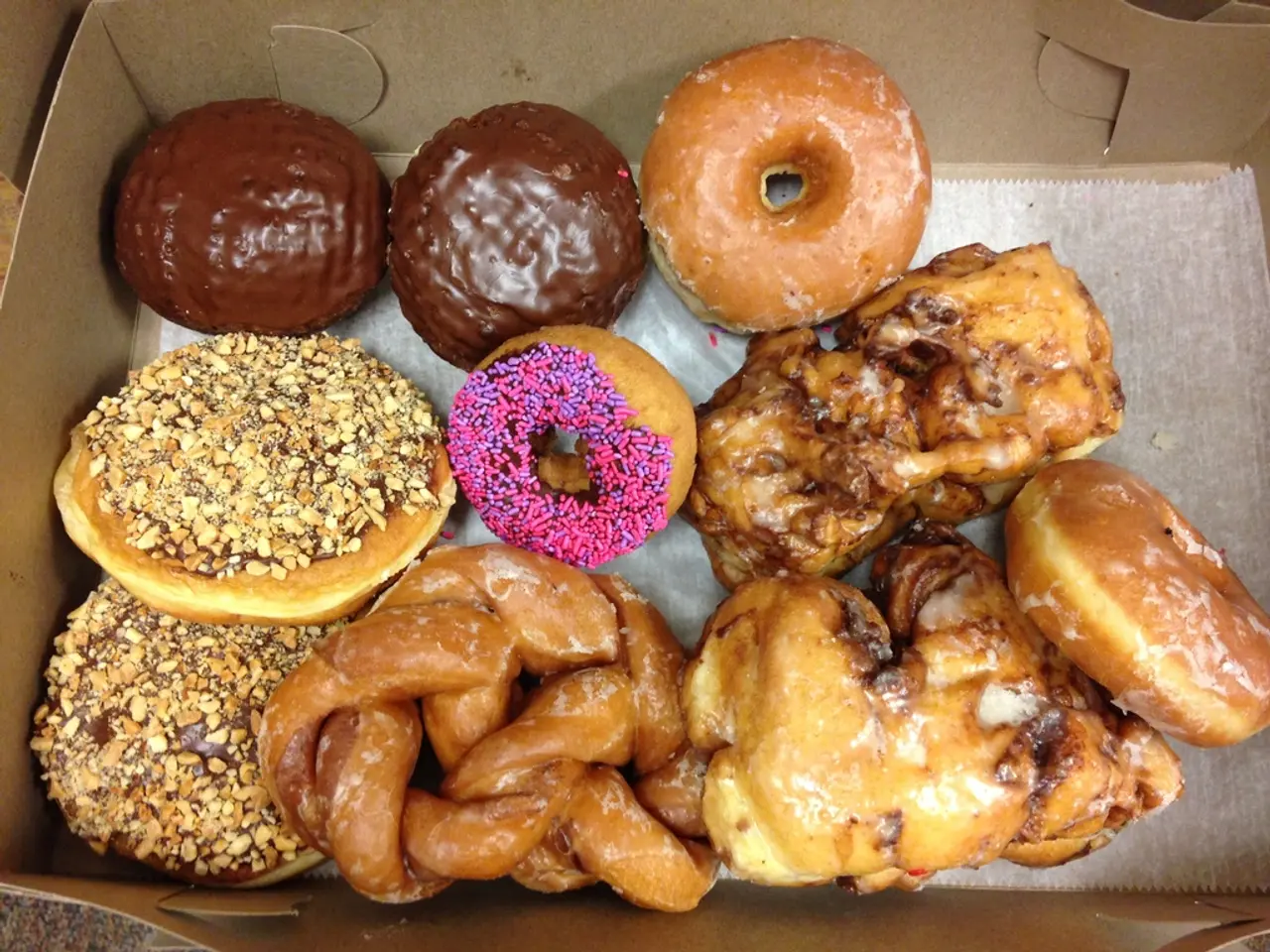Diabetes-Restricted Foods: Essential Information for Your Awareness
In the fight against diabetes, maintaining a balanced diet is crucial. The Centers for Disease Control and Prevention (CDC) recommend that people with diabetes make up about 45-60% of their daily calorie intake from carbohydrates.
Diabetes interferes with the body's ability to process blood sugar, also known as blood glucose. To help manage blood sugar levels, people with diabetes should focus on eating fruits, vegetables, and whole grains, which contain essential vitamins, minerals, and fiber.
When it comes to carbohydrates, refined and processed carbohydrates such as white bread, white pasta, white rice, and baked goods made from white flour should be limited or avoided. These foods have a high glycemic index and can cause rapid spikes in blood sugar. Sugary treats, snacks, drinks, and highly processed breakfast cereals should also be avoided due to their high sugar content.
However, whole grains like whole wheat bread, brown rice, whole-grain pasta, oats, quinoa, and barley are healthier alternatives. Legumes and beans, such as black beans, lentils, chickpeas, kidney beans, and pinto beans, are also good choices as they are high in fiber and have a lower glycemic index.
In terms of proteins, processed meats like sausages, hot dogs, bacon, and deli meats high in sodium and saturated fats should be limited. High-fat red meats, such as fatty cuts of beef and pork, especially if fried or prepared with added fats and salt, should also be avoided. Lean proteins, such as skinless poultry, fish, eggs, and plant-based proteins like tofu, tempeh, and legumes, are better choices. Low-fat dairy like skim or low-fat milk, yogurt, and cheese are also acceptable, as long as they are not loaded with added sugars.
When it comes to fats, saturated and trans fats found in butter, lard, cream, fatty meats, and many processed and fried foods should be limited. Partially hydrogenated oils, present in some margarines, baked goods, and snack foods, should also be avoided. Healthier unsaturated fats like olive oil, canola oil, nuts, seeds, avocados, and fatty fish like salmon and mackerel are better alternatives.
Following these guidelines can help individuals with or at risk of diabetes maintain better blood sugar control and overall health. For example, whole grains contain fiber, which does not break down into glucose in the body and does not add calories. Fortified soy milk is equivalent to dairy in terms of nutritional composition, and plant milks are lower in sugar than cow milk, except for oat and hazelnut milks.
It's important to note that people with high blood pressure should limit their daily sodium intake to no more than 2300 milligrams. Low-fat dairy foods without added sugar are best for people with diabetes, and the 2020-2025 Dietary Guidelines for Americans recommend at least 3 cups of dairy a day.
In conclusion, making informed food choices can significantly impact the management of diabetes. By limiting or avoiding sugary foods, refined carbohydrates, processed meats, and saturated fats, and opting for whole grains, lean proteins, and healthy fats, individuals can better control their blood sugar levels and support their overall health.
- Balanced diet is crucial in fighting diabetes, suggesting the importance of low carbohydrate intake.
- Diabetes impairs the body's sugar processing ability, a condition known as high blood glucose.
- Essential vitamins, minerals, and fiber can be found in fruits, vegetables, and whole grains.
- Refine and processed carbohydrates like white bread, pasta, rice, and baked goods, which have a high glycemic index, should be limited or avoided.
- Sugary treats, snacks, drinks, and highly processed breakfast cereals should be avoided due to their high sugar content.
- Whole grains are healthier alternatives, including whole wheat bread, brown rice, whole-grain pasta, oats, quinoa, and barley.
- Legumes and beans have a lower glycemic index and are high in fiber, supporting better blood sugar management.
- Processed meats like sausages, hot dogs, bacon, and deli meats should be limited due to high sodium and saturated fats.
- High-fat red meats should also be avoided, especially fried or prepared with added fats and salt.
- Lean proteins like skinless poultry, fish, eggs, and plant-based proteins are better choices for maintaining blood sugar levels and overall health.
- Low-fat dairy is acceptable, but should be free of added sugars to support diabetes management.
- Saturated and trans fats from butter, lard, cream, and processed and fried foods should be limited.
- Healthier unsaturated fats like olive oil, canola oil, nuts, seeds, avocados, and fatty fish support overall health and blood sugar control.
- By choosing whole grains, lean proteins, and healthy fats, individuals can better control their blood sugar levels and support medical-conditions like diabetes, while promoting health-and-wellness, fitness-and-exercise, and nutrition for cardiovascular-health.




